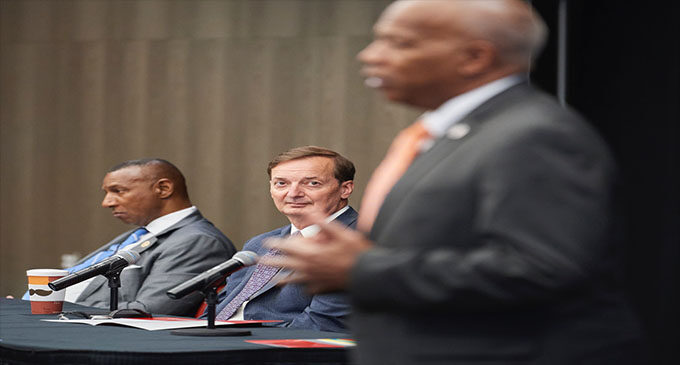Confronting a crisis through research, collective hope
-Photo by Bruce Chapman Sheriff Bobby Kimbrough and CSEM Director Craig Richardson listen as WSSU Chancellor Elwood Robinson, right, speaks at a recent panel on economic mobility.

By John Railey
A few years ago, Chancellor Elwood Robinson of Winston-Salem State University was jarred by a figure he came across in his reading: Nationwide, Forsyth County was third from the bottom in upward economic mobility. “If you were born into poverty, it was difficult to escape,” Robinson said recently.
He was troubled by the county’s contradiction: the wealth for many, the generational poverty for many more. He works daily to reverse that contradiction, encouraging students and staff to reach beyond the campus walls.
Craig Richardson, a WSSU economics professor, was also struck by the county’s low rating for economic mobility. He took action, securing a grant through the Thurgood Marshall Foundation to form, in 2017, WSSU’s Center for the Study of Economic Mobility (CSEM). Richardson became CSEM’s executive director and tapped Alvin Atkinson as the associate director.
Forsyth County Sheriff Bobby Kimbrough, having grown up in modest means in Winston-Salem, was not surprised by the figure, but is just as determined to reverse it. That figure, aggravated by the pandemic and violence, put the county in crisis mode, he suggested.
The converging paths of these men was readily apparent during a recent panel moderated by Chancellor Robinson at WSSU and sponsored by the Emerging Leaders program of the Winston-Salem Chamber. Robinson, Kimbrough, Richardson and the chamber participants tackled generational poverty tied to inequities, ranging from transportation to education, and sought solutions.
In the summer of 2020, Robinson said, the COVID pandemic underscored the local inequities. Forty percent of Black businesses nationwide were lost, he said, as well as an equal number of businesses owned by women. “How do we build that back?” Robinson asked. “That’s the challenge.”
CSEM is confronting that and other challenges through state-of-the-art, data-driven research. “Nobody was really measuring this,” Richardson said. “How do we have impact? What is working and what is not?” CSEM cut its teeth with its study of the Winston-Salem Transportation Authority bus system, which showed, among other data, that riders who used the system to get to work were spending an average of 12 hours a week waiting for buses and riding on them, inhibiting their work and parenting. It is a “time-tax,” Richardson said.
CSEM’s research has also established the efficacy of the Forsyth County Homeownership program, which helps homebuyers, many of whom are first-timers, buy houses. CSEM produced films – “Bus Stop Jobs” on the transportation issue and “Home Stretch” on the affordable housing issue – that have sparked widespread public dialogue and been catalysts for beneficial change.
More is needed. Sheriff Kimbrough said issues of hunger and educational inequalities are not being addressed. “I go in houses where kids are trying to figure out how to eat,” he said. “Then I go in other houses where you need a tour guide to show you around.”
A main problem, he suggested, is the lack of money directed to East Winston. For example, he said, more money is needed for after-school and summer programs, he said, and banks with branches in the area should contribute. “Money is a game-changer,” he said. “We can change this narrative.”
People, he said, have to see a pathway to better futures. “It’s not rocket science, people,” he said. “Social issues not addressed become criminal issues.”
He talked about the high human and financial costs of gun violence, brought home recently to many more local residents by shootings at Hanes Mall and Mount Tabor High School. There were 44 homicides in the city last year and hundreds of shootings. Many of the victims are young Black males. There have already been 18 homicides this year. “The thought that violence will stay there, it won’t come here, you can erase that thought,” Kimbrough said.
Kimbrough and Robinson encouraged their audience to speak out to “change the narrative.”
“You can’t sit silent,” Kimbrough said. He said a “Hope Force” should be formed to confront the issues of inequity tied to low economic mobility.
Robinson said: “We’re preparing for tomorrow, to be able to change the narrative.”
John Railey, raileyjb@gmail.com, is the writer-in-residence for CSEM, www.wssu.edu/csem.









